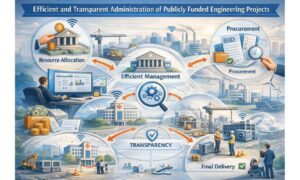In today’s tech-driven world, the backbone of any successful business relies heavily on robust technical support and maintenance. Whether you’re troubleshooting software glitches, maintaining complex hardware systems, or ensuring seamless user experiences, a career in this field offers both challenges and rewards. But what does it take to stand out among the crowd? In this blog post, we’ll dive deep into the top skills that can elevate your expertise and set you apart as an invaluable asset in technical support. From problem-solving prowess to effective communication techniques, discover how honing these essential abilities can lead to professional growth and open doors to exciting opportunities. Ready to embark on your journey toward becoming a technical superstar? Let’s get started!
Introduction to Technical Support and Maintenance Careers
The world of technology is constantly evolving, and with it comes an ever-growing demand for professionals in technical support and maintenance positions. These roles are crucial for keeping systems running smoothly and ensuring users have a seamless experience. Whether you’re troubleshooting software issues, guiding customers through installation processes, or maintaining hardware components, the skills required in this field go far beyond just technical know-how.
If you’ve ever considered a career where problem-solving meets customer interaction, diving into technical support might be your calling. As we explore the essential skills needed to thrive in this dynamic environment, you’ll discover how these traits not only enhance your employability but also position you as a valuable resource within any organization. Let’s delve into what makes an exceptional candidate stand out in the fast-paced world of tech support!
Overview of Skills Required for Success in the Field
A career in technical support and maintenance demands a versatile skill set. Professionals must blend technical knowledge with soft skills to thrive.
Problem-solving abilities are crucial. Technicians encounter various issues that require quick, logical thinking to resolve efficiently.
Technical proficiency is equally important. Understanding hardware and software systems helps in diagnosing problems accurately.
Customer service skills stand out as essential traits too. Interacting with clients means being patient, empathetic, and clear when explaining solutions.
Communication plays a pivotal role as well. Being able to relay complex information simply can make all the difference in customer satisfaction.
Additionally, adaptability is key in this fast-evolving field. Technologies change rapidly; staying updated ensures professionals remain effective and relevant.
Time management also factors heavily into success here, allowing technicians to prioritize tasks without compromising quality of service or response times.
Customer Service Skills
Customer service skills are at the heart of technical support and maintenance positions. Being able to empathize with customers creates a strong foundation for any interaction. Understanding their frustration can lead to effective problem-solving.
Listening actively is crucial. It ensures that you grasp exactly what the customer needs, allowing you to address issues more efficiently. This skill also helps build trust, making clients feel valued and understood.
Patience plays a significant role too. Technical problems can be stressful for users, so remaining calm under pressure reassures them during challenging times.
Additionally, adapting your communication style based on the customer’s knowledge level enhances their experience dramatically. Whether they’re tech-savvy or just starting out, adjusting how you explain solutions makes all the difference in providing excellent support.
Technical Proficiency and Troubleshooting Abilities
Technical proficiency is the backbone of any career in technical support and maintenance positions. This expertise allows professionals to navigate complex systems with ease. Understanding software, hardware, and networking principles is crucial.
Troubleshooting abilities take this a step further. When issues arise, quick identification of the root cause can save time and resources. The ability to analyze problems systematically sets successful technicians apart.
A strong grasp of technology also fosters confidence when assisting users. Clients often seek guidance during stressful moments; being knowledgeable reassures them that they are in capable hands.
Moreover, staying updated with industry trends enhances troubleshooting skills. New technologies constantly emerge, requiring continuous learning for optimal performance on support calls or maintenance tasks. Adaptability becomes vital as tech evolves rapidly in today’s world.
Communication and Interpersonal Skills
Effective communication is at the heart of technical support and maintenance positions. It goes beyond just relaying information; it involves actively listening to customers and understanding their concerns.
An adept technician knows how to ask the right questions, ensuring they gather all necessary details before jumping into solutions. This approach fosters trust and encourages open dialogue.
Interpersonal skills are equally crucial. Building rapport with clients can significantly enhance their experience. A friendly demeanor helps ease frustrations when technology fails them.
Moreover, collaboration within a team environment requires strong interpersonal abilities as well. Being able to communicate issues clearly among colleagues ensures that problems get resolved quickly and efficiently.
Technical jargon can sometimes alienate users, so it’s vital to translate complex concepts into simple terms without sounding condescending. Striking this balance is key in making customers feel valued while effectively addressing their needs.
Adaptability and Flexibility in a Fast-paced Environment
In the realm of technical support and maintenance, adaptability is essential. The landscape can shift rapidly with new technologies emerging and systems evolving. Professionals must be ready to pivot at a moment’s notice.
Flexibility allows team members to tackle unexpected challenges head-on. Whether it’s addressing an urgent customer issue or learning a new software tool, being open-minded makes all the difference.
A fast-paced environment often means juggling multiple tasks simultaneously. Support specialists need to switch gears quickly without losing focus on quality service.
This ability fosters resilience in high-pressure situations. Those who thrive are not just reactive but proactive, anticipating potential problems before they escalate.
Embracing change rather than resisting it enhances problem-solving skills. It empowers individuals to innovate solutions that may not follow standard protocols yet effectively meet user needs.
Time Management and Prioritization Skills
Time management and prioritization are crucial in technical support and maintenance positions. The nature of the job often involves juggling multiple tasks simultaneously, from responding to customer queries to resolving urgent issues.
Being able to assess which problems require immediate attention can make a significant difference. This skill helps you maintain efficiency while ensuring that customers feel valued.
Utilizing tools like task lists or scheduling software can assist in organizing your day effectively. Prioritizing tasks based on urgency and impact allows for smoother workflows.
Moreover, managing time well reduces stress levels. It creates an environment where challenges can be tackled without feeling overwhelmed.
In a fast-paced setting, these skills become even more essential as unexpected issues arise frequently. Mastering them can lead not only to personal satisfaction but also enhanced customer experiences.
Importance of Continuous Learning and Upgrading Technological Knowledge
In the rapidly evolving world of technology, continuous learning is not just a benefit; it’s essential. Technical support and maintenance positions require professionals to stay ahead of trends and advancements.
New software, hardware, and troubleshooting techniques emerge frequently. Keeping up with these changes ensures you provide effective solutions to clients’ problems.
Engaging in workshops, online courses, or certifications can sharpen your skills significantly. It also boosts your confidence when addressing complex issues.
Moreover, learning from peers fosters collaboration within teams. Sharing knowledge creates a culture of growth that benefits everyone involved.
Embracing this mindset prepares you for challenges that arise every day in technical environments. The more equipped you are with current information, the better service you can deliver to those who rely on your expertise.
Teamwork and Collaboration in a Supportive Role
Teamwork is the backbone of any successful technical support and maintenance position. In this field, collaboration isn’t just beneficial; it’s essential.
When issues arise, having a team to brainstorm solutions can expedite resolutions and enhance customer satisfaction. Sharing knowledge among colleagues allows for diverse perspectives that can lead to innovative problem-solving techniques.
Moreover, working closely with others fosters a supportive environment where each member feels valued. This sense of camaraderie boosts morale and encourages individuals to contribute their best efforts.
Effective teamwork also facilitates clear communication. By understanding each team member’s strengths, tasks can be delegated efficiently, ensuring a smooth workflow during high-pressure situations.
In such roles, adaptability within teams enhances productivity as members learn to pivot based on real-time feedback and evolving challenges. It’s this synergy that transforms obstacles into opportunities for growth and improvement in service delivery.
Conclusion
In today’s fast-paced and technology-driven world, technical support and maintenance professionals are in high demand. By honing these top skills such as communication, problem-solving, and staying updated on the latest developments in technology, you can excel in this career. It is also crucial to have a customer-focused mindset and ability to work well under pressure. With dedication and continuous learning, a successful career in technical support awaits you. So if you’re considering entering this field or looking to improve your existing skills, keep these key points in mind for a fulfilling career journey ahead.



































